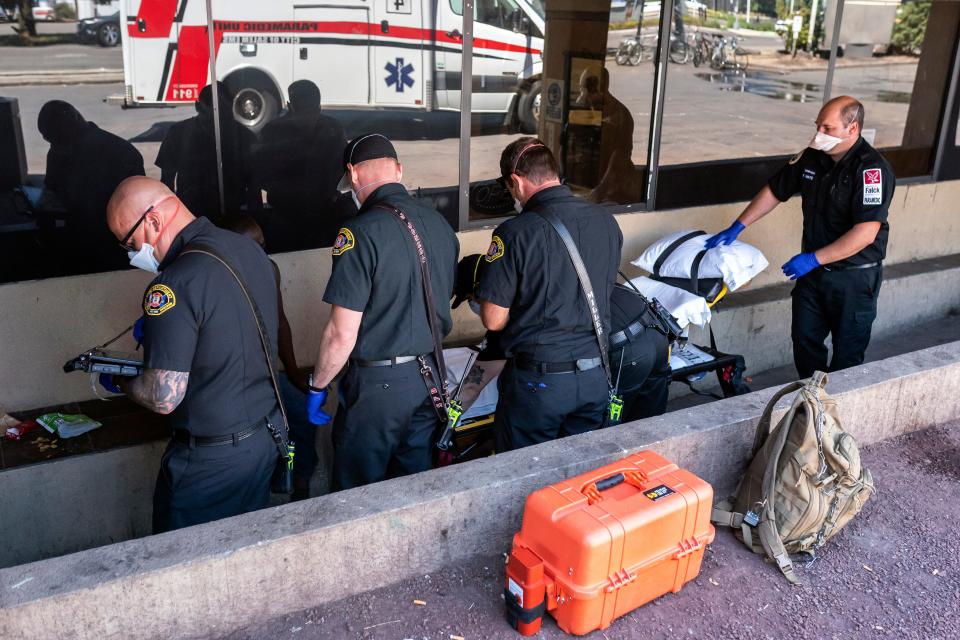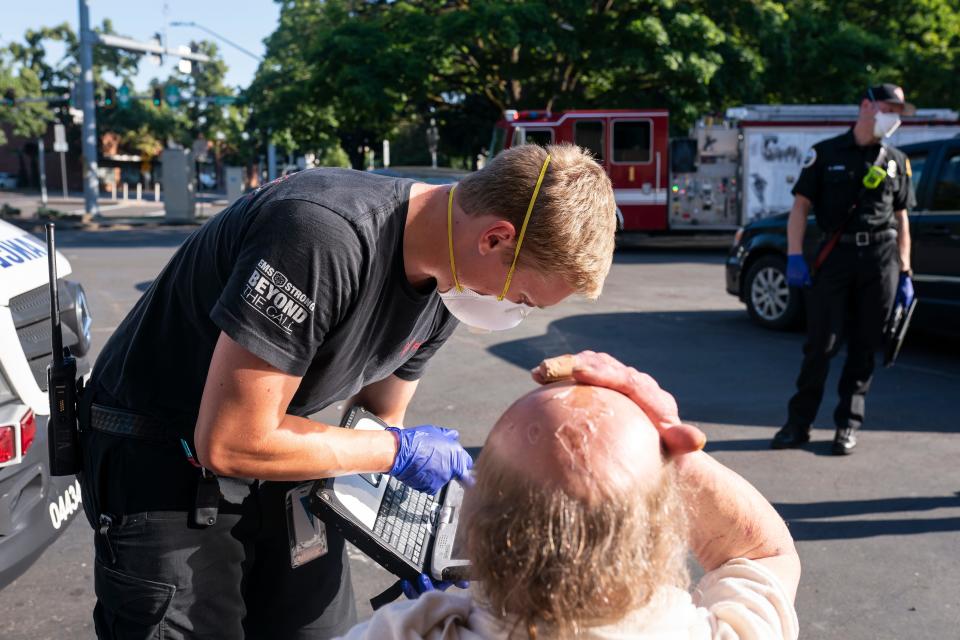Slow response from private EMS spur Salem Fire to ask to take over paramedics, ambulance
The City of Salem is considering ending its contract with Falck Northwest and taking over emergency medical service response due to slow response times and the private ambulance provider not meeting contractual obligations.
Salem Fire Chief Mike Niblock said Falck, which has operated in the city since 2015, has failed to meet their contractual requirement of 1,030 hours a week for the past year. The contract was last renewed in 2020.
"Obviously, this is a concern ... we have to make sure we serve this community that we are sworn to protect," Niblock said.
Falck blames severe staffing shortages for paramedics and contends Salem Fire would face the same workforce challenge.
The Salem City Council on March 11 tabled a vote on the contract until March 25.
Matt Brozovich, president of the Salem Professional Firefighters Local 314, testified in favor of the switch.
"Today, as we speak, the city of Salem is without six ambulances that should be staffed — six ambulances that would be positioned throughout the city, staffed with paramedics and EMTs, ready to respond to you or your loved ones if they were in need," Brozovich said.
When Falck was selected to be the provider, no city tax dollars were intended to support the private company.
Brozovich said Falck only meets its contractual obligation 39.5% of the time. He recounted the city stepping up to provide EMS assistance in November 2021 to temporarily help Falck. The situation has only worsened, he added. The city is providing two ambulances and spending millions in overtime costs to assist Falck in responding to emergencies.
"Falck Ambulance has been subsidizing their business on the backs of my members with your money for 27 months," Brozovich said. "Enough is enough ... It's time the city of Salem moves forward to a sustainable and cost-effective model."

For the past two decades, Salem has relied on contracted private ambulance services.
The decision to outsource services was made in 2005, driven by financial considerations such as low Medicaid and Medicare reimbursement rates at the time.
From 2005 to 2015, Rural/Metro of Oregon Inc. provided ambulance service. The city switched providers when Rural/Metro's contract expired. In a bidding process, Falck beat out Rural/Metro and American Medical Response. At the time, city leaders said the company met the criteria for providing the best service for Salem.
Niblock said the gap in service led Salem Fire Department to expend $3.3 million in overtime to subsidize the EMS System to ensure appropriate service delivery to the public, dating back to November 2021.
"Quite frankly, it's not working," Niblock said.
Study to ID sustainable funding for paramedics
The operational strain and overtime prompted the reevaluation of the current system.
The city commissioned a study by public safety consultants AP Triton to explore more sustainable funding models.
Leaders determined the city should shift to having Salem Fire be the exclusive ambulance service provider instead of the current model.
Falck regional managing director David Patterson warned the study did not tell the "full story" and asked to delay the vote to allow for more collaboration and analysis.
"We believe Falck can continue to partner with the city to provide EMS service in an effective and sustainable way," Patterson said. "Bringing EMS services in-house for Salem Fire is a dramatic shift with massive financial and operational risk to the City of Salem."
Jeff Lucia, the national communications director for Falck USA, said the struggle to meet the contractual obligations came down to staffing.

"Communities across the U.S. are facing a severe shortage of healthcare workers, especially paramedics, and Salem is no exception," Lucia said. "The shortage is further complicated locally by a state requirement for paramedics to have an associate’s degree."
The takeover would not solve the staffing issue, Lucia said, and put taxpayers on the hook until the transition stabilized.
Researchers also found the city could increase involvement in the Ground Emergency Medical Transport Program to increase Medicaid reimbursement and reevaluate transport fees to increase revenue — an option only available to public entities like the city and not private companies like Falck.
Niblock said the study determined the operating cost switch back to city service would be $10 million a year with $12 million in revenue. The additional GEMT fund would bring revenues up to $16 million to $17 million annually.
"That's a net positive revenue that allows us to do capital future capital projects," he said. "It really gives us a solid foundation in our EMS fund. That's why we're making this recommendation."
If passed by the council, Salem Fire would become the exclusive ambulance provider on July 1, 2025.
For questions, comments and news tips, email reporter Whitney Woodworth at wmwoodworth@statesmanjournal.com call 503-910-6616 or follow on Twitter at @wmwoodworth.
This article originally appeared on Salem Statesman Journal: Salem Fire want to switch from private EMS back to city

